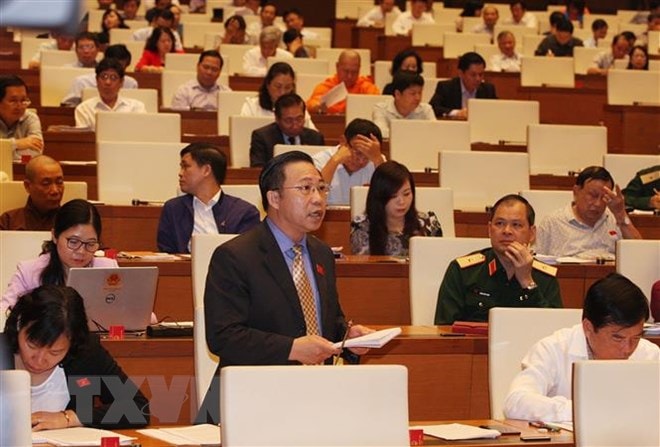This afternoon the National Assembly considered the Draft Law on People's Public Security.
The draft Law on People's Public Security submitted to the National Assembly for consideration consists of 7 chapters and 48 articles; in which there are some provisions that still have many different opinions, such as provisions on communal police and the position with the highest rank.
Continuing the working program, on the morning of November 6, National Assembly deputies worked in the hall to listen to Member of the National Assembly Standing Committee, Chairman of the National Assembly Committee on Culture, Education, Youth, Adolescents and Children Phan Thanh Binh present a Report on explanation, acceptance and revision of the draft Law on amending and supplementing a number of articles of the Law on Higher Education. After that, the deputies discussed this draft Law.
 |
| National Assembly delegate of Ben Tre province Luu Binh Nhuong speaks. (Photo: Nguyen Dan/VNA) |
The draft Law amending and supplementing a number of articles of the Law on Higher Education was commented on by the National Assembly at the 5th Session.
At this session, the draft Law will be discussed and approved by the National Assembly, in which a number of major contents have been absorbed and revised.
Regarding the system of higher education institutions, it is expected to include Universities, Colleges, Academies and other higher education institutions with names in accordance with the provisions of law, in which the University is considered the basic nucleus and foundation of the system.
Regarding promoting university autonomy: the draft stipulates a mechanism to ensure autonomy through clearly defining the institution of the school council, defining the relationship between the school council and the Principal; regulating a governance mechanism appropriate to the nature of each type of higher education institution; adding many contents towards strengthening autonomy associated with accountability of higher education institutions in terms of academic expertise, organization and personnel, finance and assets.
According to the program, the draft Law amending and supplementing a number of articles of the Law on Higher Education will be passed at this session.
In the afternoon session, the National Assembly listened to Member of the National Assembly Standing Committee, Chairman of the National Assembly's Committee on National Defense and Security Vo Trong Viet present a Report on explanation, acceptance and revision of the People's Public Security Law project and discuss in the hall a number of contents with different opinions of the Law project.
The draft Law on People's Public Security submitted to the National Assembly for consideration and approval consists of 7 chapters and 48 articles; in which there are a number of provisions that have many different opinions, such as provisions on regular commune and town police; on positions with the highest rank of lieutenant general; and on ranks for provincial-level Public Security Directors.
Regarding the rank of provincial police directors, there are currently two opinions: First, it is proposed to stipulate that the provincial police directors (except for the Hanoi and Ho Chi Minh City Police Directors) have the highest rank of Colonel, because in the process of building the 2014 Law on People's Public Security, it was agreed that the ranks of the police and army at the provincial and district levels are equivalent.
The second type of opinion basically agrees with the provisions of the draft Law because in recent times, the Ministry of Public Security has innovated and reorganized its apparatus, no longer having a General Department-level model but focusing on decentralizing authority and adding functions and tasks to provincial-level police.
The open regulations as drafted will facilitate the arrangement of staff working at the Departments and General Departments after the reorganization, as well as in the rotation of staff between units under the Ministry and provincial-level police in the coming time, without increasing the number of officers with the rank of general in the people's police force./.








